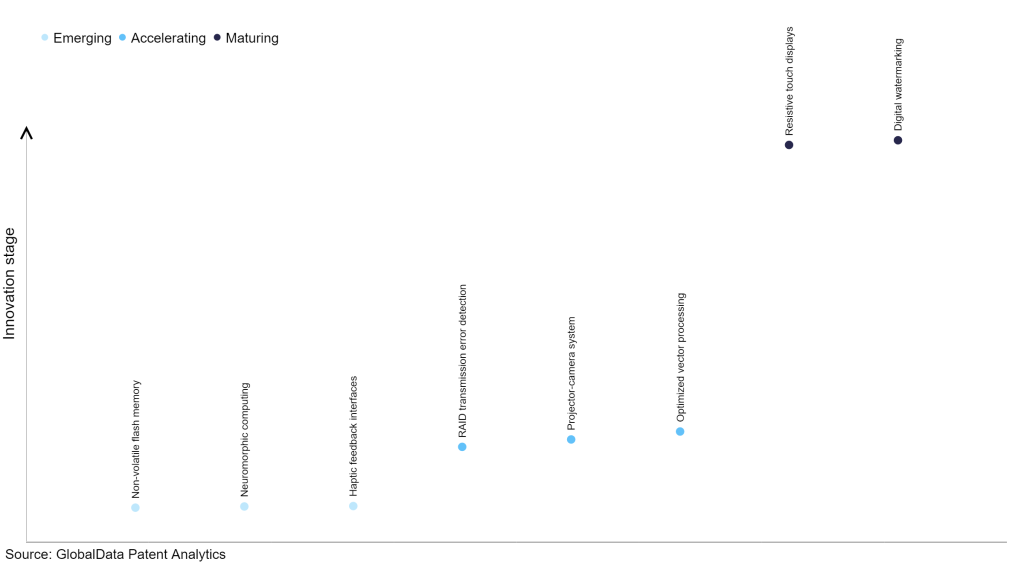The technology industry continues to be a hotbed of patent innovation. Activity is driven by artificial intelligence (AI), machine learning and the Internet of Things (IoT), and growing importance of technologies involving computer vision algorithms advanced cameras, infrared sensors, and smart eye-tracking devices to improve occupational safety and efficiency. In the last three years alone, there have been over 1.5 million patents filed and granted in the technology industry, according to GlobalData’s report on Innovation in technology: gaze tracking. Buy the report here.
However, not all innovations are equal and nor do they follow a constant upward trend. Instead, their evolution takes the form of an S-shaped curve that reflects their typical lifecycle from early emergence to accelerating adoption, before finally stabilizing and reaching maturity.
Identifying where a particular innovation is on this journey, especially those that are in the emerging and accelerating stages, is essential for understanding their current level of adoption and the likely future trajectory and impact they will have.
185+ innovations will shape the technology industry
According to GlobalData’s Technology Foresights, which plots the S-curve for the technology industry using innovation intensity models built on over 1.6 million patents, there are 185+ innovation areas that will shape the future of the industry.
Within the emerging innovation stage, non-volatile flash memory, neuromorphic computing, and haptic feedback interfaces are disruptive technologies that are in the early stages of application and should be tracked closely. RAID transmission error detection, projector-camera system, and optimized vector processing are some of the accelerating innovation areas, where adoption has been steadily increasing. Among maturing innovation areas are resistive touch displays and digital watermarking, which are now well established in the industry.
Innovation S-curve for the technology industry

Gaze tracking is a key innovation area in technology
The act of measuring and observing the movement and focus of a person's eyes is referred to as gaze tracking. This technology is often utilised in research, marketing, and user experience analysis to determine where an individual's attention is directed and how they interact with their surroundings.
GlobalData’s analysis also uncovers the companies at the forefront of each innovation area and assesses the potential reach and impact of their patenting activity across different applications and geographies. According to GlobalData, there are 135+ companies, spanning technology vendors, established technology companies, and up-and-coming start-ups engaged in the development and application of gaze tracking.
Key players in gaze tracking – a disruptive innovation in the technology industry
‘Application diversity’ measures the number of applications identified for each patent. It broadly splits companies into either ‘niche’ or ‘diversified’ innovators.
‘Geographic reach’ refers to the number of countries each patent is registered in. It reflects the breadth of geographic application intended, ranging from ‘global’ to ‘local’.
Patent volumes related to gaze tracking
Source: GlobalData Patent Analytics
Among the companies innovating in gaze tracking, Magic Leap is the leading patent filer. One of the company’s patents is aimed at creating a virtual image generation system in which a plurality of synthetic image frames of the three-dimensional scene is rendered and sequentially displayed to an end user. Each of the displayed image frames has a non-uniform resolution distribution.
Other prominent patent filers in the gaze tracking space include The Saudi Public Investment Fund and Samsung Group.
By geographic reach, RealView Imaging leads the pack, followed by The Saudi Public Investment Fund and Tectus. In terms of application diversity, The Saudi Public Investment Fund holds the top position, followed by Samsung Group and Sony Group.
Gaze tracking can help identify user preferences and interactions, leading to the development of more intuitive interfaces and better user experiences. It provides insights to improve marketing strategies and the diagnosis and treatment of eye-related diseases and disorders, and monitor a driver's attention on the road, helping to prevent accidents and increase safety.
To further understand the key themes and technologies disrupting the technology industry, access GlobalData’s latest thematic research report on Technology.
Data Insights
From

The gold standard of business intelligence.
Blending expert knowledge with cutting-edge technology, GlobalData’s unrivalled proprietary data will enable you to decode what’s happening in your market. You can make better informed decisions and gain a future-proof advantage over your competitors.







